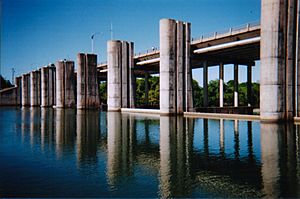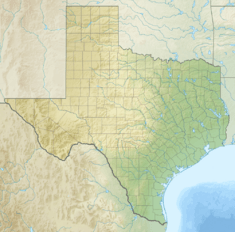Longhorn Dam facts for kids
Quick facts for kids Longhorn Dam |
|
|---|---|

The upstream side of Longhorn Dam in 2005
|
|
|
Location of Longhorn Dam in USA Texas
|
|
| Official name | Longhorn Dam |
| Location | Austin, Texas, United States |
| Coordinates | 30°15′1″N 97°42′49″W / 30.25028°N 97.71361°W |
| Opening date | 1960 |
| Operator(s) | City of Austin |
| Dam and spillways | |
| Impounds | Colorado River |
| Height | 36 feet (11 m) |
| Length | 506 feet (154 m) |
| Reservoir | |
| Creates | Lady Bird Lake |
| Surface area | 471 acres (191 ha) |
Longhorn Dam is a large structure built across the Colorado River in Austin, Texas, USA. It helps create a beautiful lake called Lady Bird Lake. The dam was finished in 1960. It was built by the City of Austin. It was the last of several dams built on the Colorado River in central Texas. These dams started being built during the Great Depression. The dam is named Longhorn because it's near a shallow part of the river. This spot was once used for driving longhorn cattle across the river. This happened during the famous Chisholm Trail cattle drives in the late 1800s.
Contents
Building the Dam
Longhorn Dam was built in the late 1950s. Its main job was to create a cooling pond for Austin's Holly Street Power Plant. This power plant used natural gas and fuel oil to make electricity. The lake it created, Lady Bird Lake, also provided drinking water for the city at first.
It's important to know that Longhorn Dam is not a hydroelectric dam. This means it does not make electricity from the force of water.
Changes Over Time
In 2007, the Holly Street Power Plant was closed down. Later, it was taken apart. This made room for a new park along the lake. Today, Lady Bird Lake is mostly used for fun activities like boating and fishing.
The dam also helped make the shoreline stable in downtown. This allowed new parks to be built along the lake. Examples include Auditorium Shores and other parts of Town Lake Park.
Keeping the Dam Working
In the 2000s and 2010s, the dam's floodgates sometimes had problems. When the gates didn't close right, a lot of water would flow out of the lake.
The city power company, Austin Energy, first built and ran the dam. But in April 2018, Austin Water took over running the dam.
Since 2013, Austin Energy has done many repairs and updates to the dam. They replaced important parts and fixed the systems that control the gates. They also repaired one of the gates and its lifting system.
City officials have said that replacing the dam would cost tens of millions of dollars. Between 2013 and 2018, Austin Energy spent about $1.6 million on dam repairs and upkeep.
Where the Dam Is Located
Longhorn Dam is located at specific coordinates: 30.2504° North and -97.7135° West. The water level of Lady Bird Lake is usually about 428 feet (130 meters) above sea level.
Lady Bird Lake, which used to be called Town Lake, is about 5.75 miles (9.25 kilometers) long. It covers an area of about 471 acres (191 hectares). The amount of water released from the dam changes. It depends on how much rain falls and how much water is needed downstream for farming.
How the Dam Works
The dam stands about 36 feet (11 meters) high. It stretches 506 feet (154 meters) across the Colorado River.
It has nine floodgates that help control the water flow and keep the lake's water level steady.
- Two of these are "bascule gates." These gates open on their own to let water through. They help keep Lady Bird Lake at the right level.
- The other seven gates are "lift gates." These gates are controlled by people. They are adjusted to manage water flow based on weather and to release water for the environment and farming downstream.
 | Isaac Myers |
 | D. Hamilton Jackson |
 | A. Philip Randolph |


